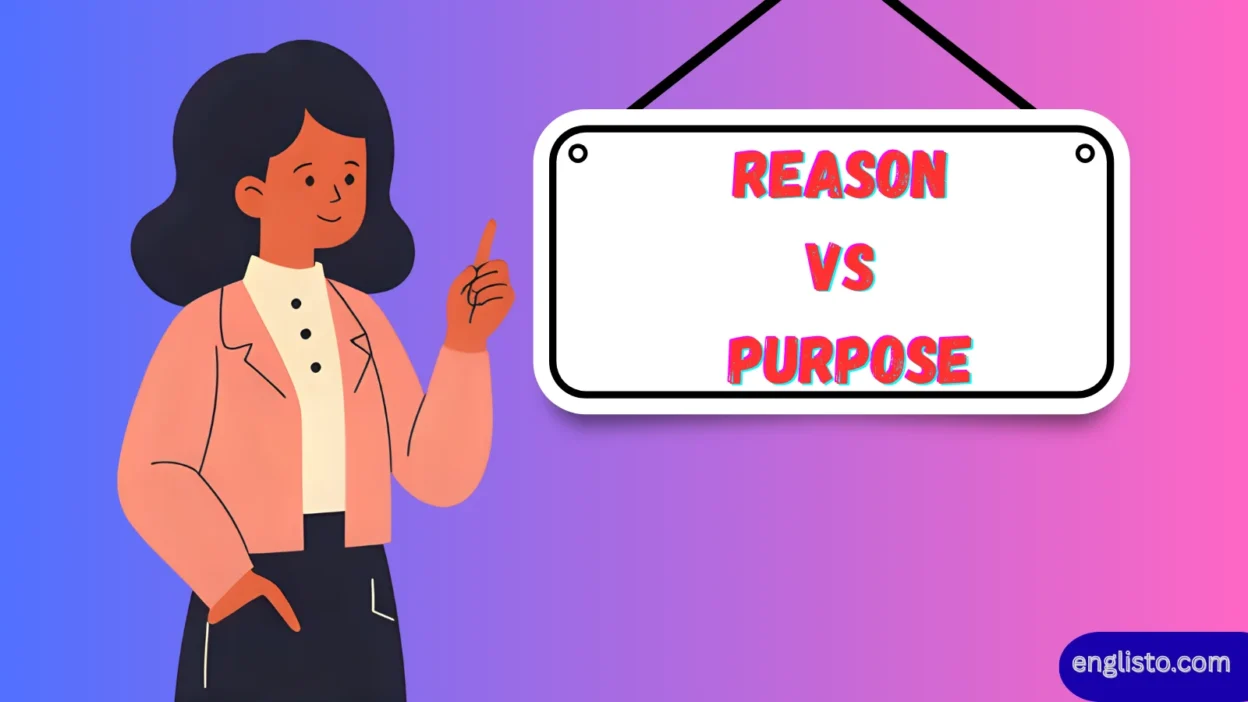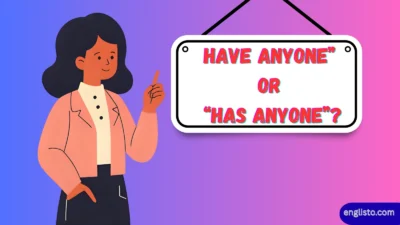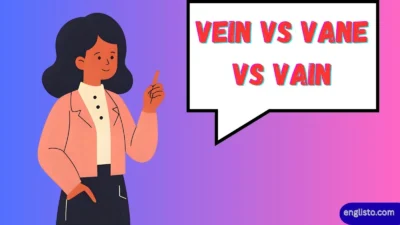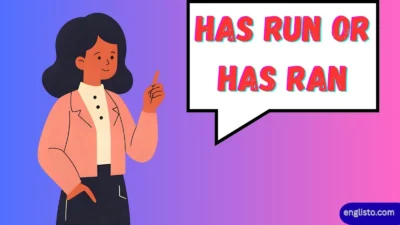Understanding the difference between reason and purpose is like unlocking two sides of the same coin: why we do something and what we do it for. These two words often appear side by side in conversations, self-help books, and philosophical debates — but they’re not twins. Knowing how to distinguish them gives your thinking, writing, and life direction a sharper edge.
Understanding “Reason” and “Purpose”: Definitions and Distinctions
| Word | Core Meaning | Typical Question It Answers | Example |
| Reason | The cause or motive behind an action | “Why did it happen?” | The reason she left early was the storm. |
| Purpose | The goal or intended outcome | “What is it for?” | The purpose of this project is to educate teens. |
Reason is backward-looking — it explains why something happened.
Purpose is forward-looking — it explains what you hope to achieve.
Think of reason as the engine that starts motion, and purpose as the destination that gives direction.
Why It Matters: The Impact of Confusing Reason and Purpose
When people mix up the two, their goals become cloudy.
You might justify your actions (reason) but forget your long-term vision (purpose).
Example:
Reason: “I started this business to earn more money.”
Purpose: “I want to empower local artisans to live sustainably.”
The first is a motivation. The second is a mission.
Clarity between the two keeps you grounded and inspired — essential for personal growth, leadership, and effective communication.
Reason as Cause, Motive, Explanation
“Reason” digs into the why behind behavior or events. It’s rooted in logic, evidence, and cause-and-effect.
| Aspect | Description | Example |
| Cause | Direct trigger or stimulus | The rain was the reason the match was canceled. |
| Motive | Inner desire or need | Her reason for studying psychology was curiosity about human behavior. |
| Explanation | Logical justification | The teacher gave a clear reason for the new rule. |
Grammar Tip:
- “Reason for” + noun → The reason for the delay…
- “Reason why” + clause → The reason why I called…
Purpose as Goal, Aim, Intention
Purpose gives actions a sense of direction and meaning.
It’s less about logic, more about vision.
| Dimension | Description | Example |
| Goal | Desired end state | The purpose of exercise is to stay healthy. |
| Intention | Planned motivation | She volunteered with the purpose of helping others. |
| Meaning | Deeper fulfillment | His purpose in life is to teach and inspire. |
Purpose transcends the immediate cause — it stretches into the realm of meaning and identity.
Reason vs Purpose in Everyday Speech
In casual talk, both words can overlap, but context matters.
Common Confusion Table:
| Sentence | Correct Word | Why |
| What’s the ___ you came here? | Reason | Asking for cause. |
| What’s the ___ of this device? | Purpose | Asking for intended use. |
| The ___ I called is to discuss plans. | Reason | Asking for motivation. |
| The ___ of my visit is to help. | Purpose | Asking for goal. |
The subtle difference shapes your message — a hallmark of clear communication.
Reason vs Purpose in Philosophy and Psychology
In philosophy, reason relates to rational thinking, while purpose ties to teleology — the study of design and ends.
- Philosophers like Aristotle explored telos (purpose) as the final cause of existence.
- Psychologists focus on reasons (motives) that drive human behavior.
In short:
Philosophy asks, “What’s the purpose of life?”
Psychology asks, “What’s your reason for behaving this way?”
Cause, Motive, Reason, Purpose: A Conceptual Map
| Concept | Direction | Focus | Example |
| Cause | Backward | Physical or logical origin | Fire caused the alarm. |
| Motive | Internal | Emotional or psychological trigger | His motive was jealousy. |
| Reason | Rational | Justified explanation | The reason he apologized was guilt. |
| Purpose | Forward | End goal or aim | The purpose was reconciliation. |
Visualizing this map helps you grasp the flow from cause → motive → reason → purpose.
Examples of Reason vs Purpose in Daily Life
| Context | Reason | Purpose |
| Career | To earn a living | To create value or make an impact |
| Education | To pass exams | To gain wisdom or skills |
| Relationships | To avoid loneliness | To share love and growth |
| Exercise | To lose weight | To live a long, energetic life |
| Writing | To express thoughts | To inspire or educate readers |
The reason keeps you active. The purpose keeps you aligned.
Reason and Purpose in Goal-Setting: How They Interact
A powerful goal balances reason (motivation) and purpose (direction).
| Step | Focus | Example |
| 1 | Identify your reason | “I want to save money because I value security.” |
| 2 | Define your purpose | “My purpose is to build a home for my family.” |
| 3 | Align both | “I’ll budget wisely to create a stable, happy home.” |
When reason and purpose meet, goals become sustainable.
How Reason Drives Action Immediately
Reasons are short-term triggers — they get you moving now.
- You study because there’s an exam tomorrow.
- You call a friend because you feel lonely.
They’re practical, reactive, and situational — but often fleeting.
Without purpose, reasons can lose momentum.
How Purpose Guides Life Arc Over Time
Purpose is your north star.
It’s not about a single task but the story your life tells.
- A teacher’s purpose might be to nurture future thinkers.
- An entrepreneur’s purpose might be to solve real problems.
Purpose lasts even when immediate reasons change.
Reason vs Purpose in Business, Leadership, Project Planning
In organizations, the balance of reason and purpose defines culture.
| Business Element | Reason | Purpose |
| Strategy | Increase market share | Empower customers |
| Marketing | Sell products | Build relationships |
| Leadership | Manage teams | Inspire people |
| CSR | Fulfill legal duties | Contribute to society |
Companies like Patagonia and Tesla thrive because their purpose outweighs profit — yet they still have solid reasons for every decision.
Aligning Reason and Purpose for Coherence
Here’s the formula for harmony:
Reason + Purpose = Authentic Action
When your reasons (motives) and purposes (visions) match, life feels aligned.
Checklist:
- ✅ Are my reasons honest?
- ✅ Does my purpose serve others or a greater good?
- ✅ Do my daily actions reflect both?
When Reason and Purpose Conflict (Tension Zones)
Sometimes your reasons pull one way while your purpose pulls another.
Example:
- Reason: “I need this job for income.”
- Purpose: “I want to work in creative freedom.”
Solution:
Reevaluate whether the reason supports or distracts from your larger purpose.
Balance short-term necessity with long-term meaning.
Turning Reasons Into Purpose: Steps and Mindset
- List your reasons for what you do.
- Group them into themes (security, growth, love, service).
- Ask: What greater purpose unites these?
- Reframe: Turn “because” into “so that.”
- “I teach because I love kids.” → “I teach so that children can flourish.”
- “I teach because I love kids.” → “I teach so that children can flourish.”
That small linguistic shift changes reaction into intention.
Purpose-Driven Life: Walking Your Why
As Simon Sinek said, “People don’t buy what you do; they buy why you do it.”
Living purpose-first means your actions express your deeper “why.”
| Habit | Description | Example |
| Reflect | Ask what drives your choices | Journaling |
| Refine | Adjust goals to fit your purpose | Career pivot |
| Reconnect | Return to what matters | Family, values, community |
Reason-First vs Purpose-First Decision Making
| Approach | Pros | Cons | Example |
| Reason-First | Logical, efficient | Can lack meaning | “I’ll choose the job with higher pay.” |
| Purpose-First | Fulfilling, inspiring | Can ignore reality | “I’ll choose the job that helps others.” |
Best practice? Integrate both — choose actions that make sense and make meaning.
Rewriting Narratives: Reframing Your “Reasons” as “Purpose”
Instead of staying stuck in explanations (“I did it because…”), write your story forward (“I’m doing it for…”).
This transforms regret into growth.
Example:
“I left my old city because I felt trapped.” → “I moved to build a freer, fuller life.”
That’s not just semantics — it’s empowerment.
Synonyms, Near-Synonyms, and Nuance Table
| Word | Related to | Subtle Difference |
| Reason | Cause, explanation | Focus on logic |
| Purpose | Aim, mission | Focus on meaning |
| Intent | Closest to purpose | Mixes both will and plan |
| Justification | Closer to reason | Often defensive |
| Objective | Neutral goal | Practical, not emotional |
Grammar Note: “Reason for / Reason why / Purpose of / Purpose for”
| Expression | Usage | Example |
| Reason for + noun | General cause | The reason for delay |
| Reason why + clause | Specific explanation | The reason why she left |
| Purpose of + noun | Goal | The purpose of this tool |
| Purpose for + gerund | Function | The purpose for meeting today |
Pitfalls: Over-Justification, Mission Drift, Shallow Reasons
Avoid:
- Over-justifying: Explaining every action drains authenticity.
- Mission drift: Losing your core purpose chasing minor reasons.
- Shallow reasons: “Because everyone does it” is never enough.
Depth comes from connecting logic with meaning.
Quotes on Reason, Purpose, and Intentionality
“The two most important days in your life are the day you are born and the day you find out why.” — Mark Twain
“Reason is the steering wheel, purpose is the compass.” — Anonymous
“He who has a why to live can bear almost any how.” — Friedrich Nietzsche
Real-Life Stories of People Shifting from Reason to Purpose
- Oprah Winfrey: Started in media for survival — stayed to uplift voices.
- Elon Musk: Began with curiosity about technology — evolved to purpose: making life multiplanetary.
- J.K. Rowling: Wrote to escape hardship — ended up inspiring millions.
Each turned personal reasons into powerful purposes.
Exercises to Discover Your Deeper Purpose
- The Five Whys: Ask “why?” five times about any goal.
- Purpose Map: Write your top three reasons → connect them to one purpose.
- Vision Board: Visualize the world you want to help create.
- Journaling Prompt: “What would I do if I couldn’t fail?”
Summary Comparison: Reason vs Purpose in a Table
| Feature | Reason | Purpose |
| Time Focus | Past / Present | Future |
| Nature | Logical / Reactive | Visionary / Meaningful |
| Driven by | Cause / Motivation | Mission / Intention |
| Duration | Short-term | Long-term |
| Example | “I study because of the test.” | “I study to improve my mind.” |
Conclusion: Let Reason Serve Purpose
Reason explains, purpose inspires.
Reason answers why we start; purpose defines where we’re going.
In a balanced life — or a meaningful sentence — both matter.
When you align your reasons with your purpose, logic meets heart.
That’s where clarity, peace, and motivation live side by side.
FAQs
Q1. What’s the main difference between reason and purpose?
Reason is the cause or explanation, while purpose is the goal or intention.
Q2. Can one action have multiple reasons and one purpose?
Absolutely. You might run for many reasons — health, stress relief — but one purpose: to live fully.
Q3. How do I find my life’s purpose?
Reflect on what gives meaning, energy, and contribution beyond personal gain.
Q4. Are “reason why” and “purpose of” interchangeable?
Not quite. “Reason why” explains cause; “purpose of” identifies function or intent.
Q5. How can I teach this distinction to students?
Use real examples, fill-in-the-blank exercises, and side-by-side tables. Context makes clarity stick.



